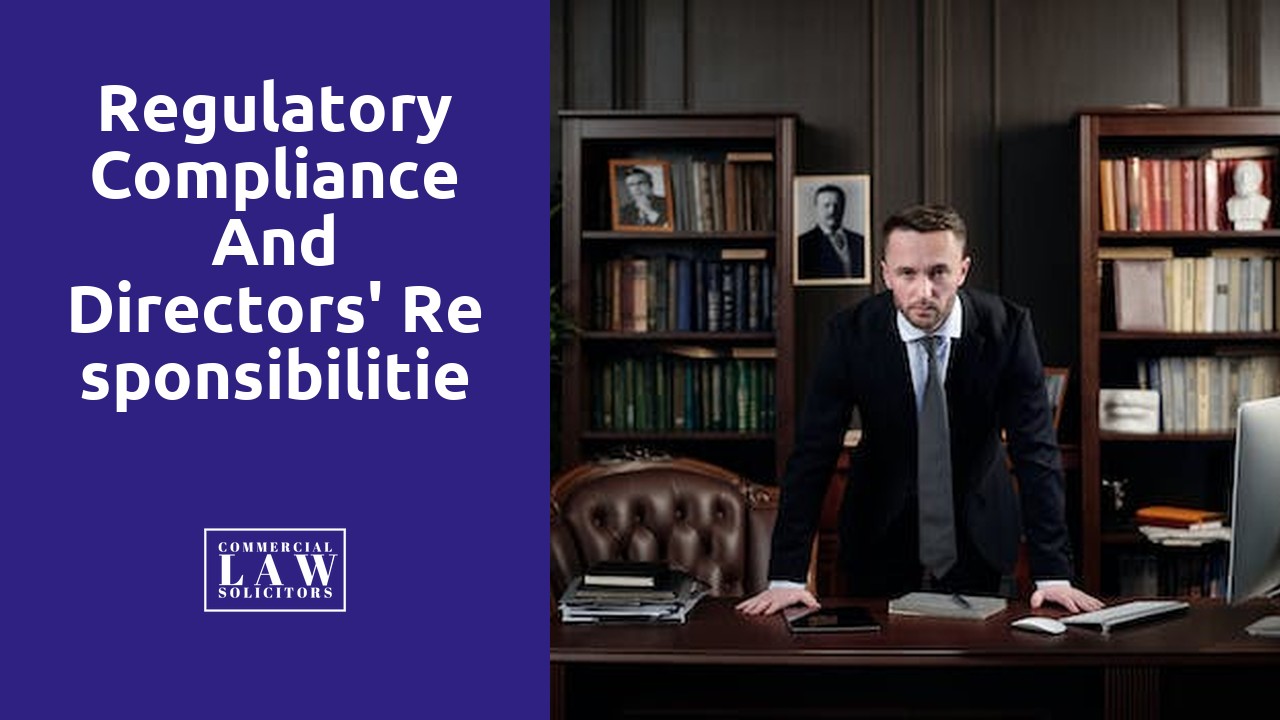Regulatory Compliance and Directors' Responsibilities

Navigating the World of Business Regulations: Important Considerations for Directors
Directors play a pivotal role in navigating the intricate world of business regulations. In today's complex and ever-changing landscape, it is crucial for directors to stay informed and up-to-date on the regulations that govern their organizations. This requires a deep understanding of both local and international laws and a commitment to compliance.
One important consideration for directors is the potential impact of regulations on the organization's operations and strategy. Directors must assess the regulatory environment and identify potential risks and opportunities that may arise. This involves conducting thorough risk assessments, engaging with stakeholders, and remaining proactive in monitoring regulatory changes. By doing so, directors can effectively navigate the world of business regulations and ensure the organization operates within the confines of the law.
The Key Role of Directors in Upholding Ethical Standards
Directors of organizations play a crucial role in upholding ethical standards within their respective entities. As the individuals responsible for overseeing the operations and decision-making processes, directors have the power to set the tone from the top and create a culture of ethical behavior. By establishing clear guidelines and expectations, directors can create an environment where employees feel empowered to act with integrity and make ethical choices.
Furthermore, directors have the responsibility to lead by example and demonstrate ethical behavior themselves. Their actions and decisions are closely observed by employees, stakeholders, and the public, making it essential for directors to act in the best interest of the organization while adhering to the highest ethical standards. Directors should demonstrate transparency, fairness, and accountability in all their interactions and decisions, setting the standard for others to follow. This not only helps to build trust and credibility but also fosters a culture of ethical behavior throughout the organization.
Staying Ahead of the Game: Directors and the Changing Landscape of Compliance
The landscape of compliance is constantly evolving, and directors must be proactive in order to stay ahead of the game. In today's business world, new regulations and requirements emerge frequently, making it crucial for directors to have a deep understanding of the changing compliance landscape. This requires continuous education and keeping up-to-date with industry trends and best practices.
One way directors can stay ahead of the game is by developing strong relationships with regulatory bodies and industry experts. By engaging in meaningful dialogue and building trust, directors can gain insights into upcoming changes and potential challenges. This allows them to anticipate and prepare for regulatory shifts, ensuring their organizations remain compliant while also being able to adapt and seize opportunities in the evolving business environment. Directors who are proactive and proactive are well positioned to provide guidance and leadership to their organizations as they navigate the changing landscape of compliance.
Balancing Risk and Responsibility: How Directors Can Safeguard Their Organizations
Directors play a crucial role in safeguarding their organizations by effectively balancing risk and responsibility. As leaders entrusted with the well-being of the company, directors must be proactive in identifying potential risks and taking appropriate measures to mitigate them. This involves staying informed about the ever-changing regulatory landscape and implementing robust internal controls and compliance frameworks.
One key aspect of balancing risk and responsibility is the establishment of a strong risk management framework. Directors need to ensure that there is a structured approach in place to identify, assess, and manage various risks that could impact the organization's operations, reputation, and financial stability. This includes conducting regular risk assessments, monitoring key risk indicators, and implementing effective risk mitigation strategies. By actively engaging in risk management, directors can help safeguard their organizations from potential threats and ensure that necessary measures are in place to address any unforeseen circumstances.
The Power of Accountability: Directors' Impact on Compliance Culture
Directors play a crucial role in shaping the compliance culture of their organizations. With the power of accountability in their hands, they have the ability to instill an environment where adherence to regulations is a core value. By providing clear guidance and expectations, directors can set the tone for ethical behavior and inspire employees to prioritize compliance.
Accountability starts at the top. Directors must actively lead by example, demonstrating their commitment to compliance through their own actions and decisions. This not only reinforces the importance of following regulations but also creates a sense of responsibility among employees. When directors take ownership of compliance, it sends a powerful message that no one is exempt from adhering to the rules. Through their accountability, directors can foster a culture where compliance is not just a checkbox exercise, but a fundamental part of the organization's values and principles.
Unlocking Success: How Directors Can Drive Regulatory Compliance Initiatives
Directors play a vital role in driving regulatory compliance initiatives within organizations. Their leadership and commitment to upholding ethical standards set the tone for the entire company. By creating a culture of compliance, directors can ensure that all employees understand the importance of adhering to regulations and following best practices.
To drive regulatory compliance initiatives, directors must first establish clear policies and procedures that align with relevant regulations. These policies should clearly outline the responsibilities of employees and the consequences of non-compliance. Directors should also regularly communicate these policies to all levels of the organization to ensure understanding and buy-in. Additionally, directors should lead by example and demonstrate their commitment to compliance through their own actions. By providing the necessary resources and support, directors can empower employees to prioritize compliance and ensure that regulatory requirements are met.
Related Links
Role of Directors in Financial Reporting and TransparencyDirector's Duty of Loyalty and Avoiding Conflicts of Interest
Corporate Insolvency and Director's Duties during Financial Distress